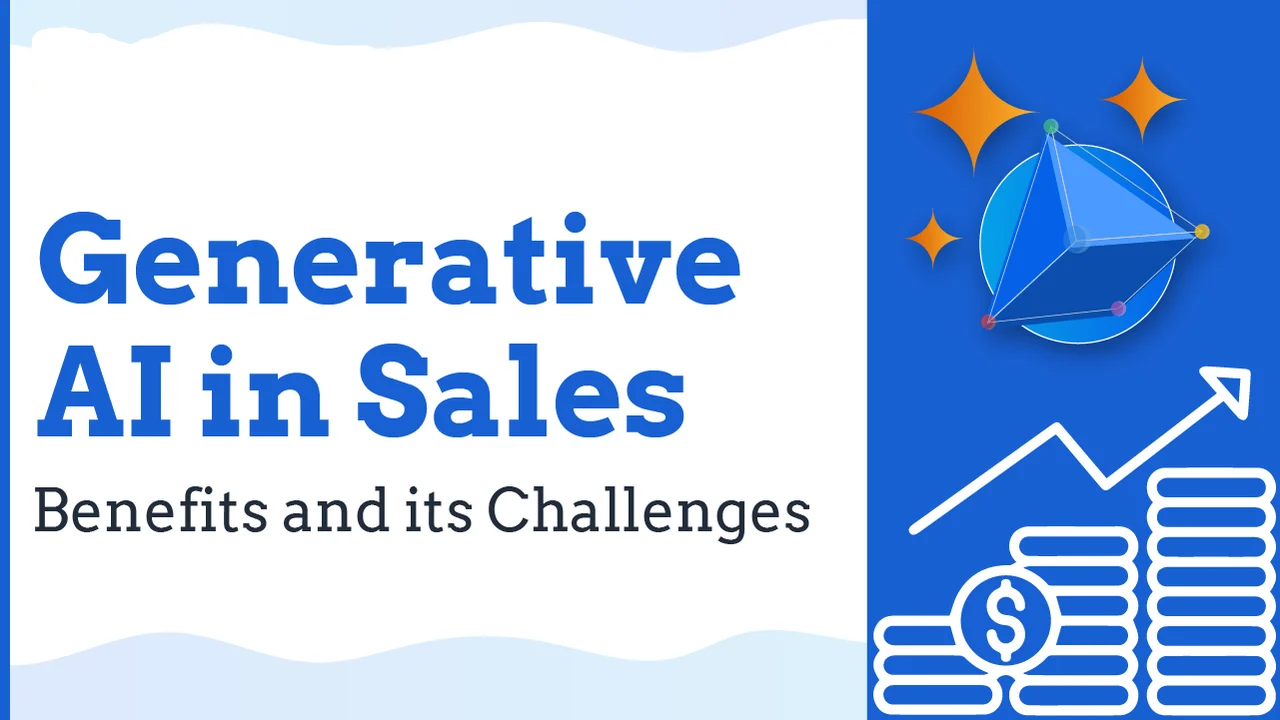Introduction to Generative AI
AI brought a revolution into this world, and now, in this generation, everyone uses some technology that has AI in it, businesses became more and more vast, education became easy, AI is taking control over everything and making it much faster and crossing human limits.
The world of sales has undergone remarkable transformations with the advent of artificial intelligence (AI) and its diverse applications. Among these groundbreaking technologies, generative AI stands out as a powerful tool with the potential to revolutionize sales processes and drive unprecedented growth. By harnessing the capabilities of intelligent automation, generative AI empowers sales teams to make data-driven decisions, enhance customer experiences, and optimize sales operations. In this blog post, we will delve into the profound implications of generative AI in sales, exploring its key benefits and addressing the challenges it presents.
Implementing Generative AI in Sales
Generative AI encompasses a subset of AI techniques that involve training models to generate novel content, such as images, text, or even entire conversations, based on existing data patterns, big data. This technology leverages sophisticated machine learning algorithms that train AI machines to work better than us, such as deep neural networks, to create synthetic yet remarkably realistic content, which helps to collect more information about clients and customers and to make changes according to their needs. Within the sales domain, generative AI can be effectively deployed to automate and optimize various sales processes, including lead generation, customer segmentation, personalized messaging, sales forecasting, and more.
What are the Benefits of Generative AI in Sales?
The benefits of Generative AI in Sales are described below:
Enhanced Lead Generation and Qualification
Generative AI algorithms can analyze vast volumes of customer data called big data and then collect data about data to make it more clear about client needs, empowering sales teams to identify and target high-potential leads with greater precision. By discerning patterns and preferences, generative AI assists in creating accurate buyer personas and predicting customer behaviors. Consequently, the lead qualification process becomes streamlined, ensuring that sales efforts are focused on prospects with the highest likelihood of conversion.
Personalized Customer Experiences
Generative AI enables sales teams to deliver personalized customer interactions at scale. Analyzing historical data and customer preferences allows AI algorithms to generate tailored recommendations, customized messages, and personalized offers. This level of personalization not only enhances customer satisfaction but also significantly increases the likelihood of successfully closing deals. Furthermore, generative AI has the potential to automate customer communication through chatbots, providing round-the-clock support and instant responses. It saves a lot of human effort and time.
Sales Forecasting and Predictive Analytics
Accurate sales forecasting is pivotal in effective resource allocation and planning. We are humans, and we can make mistakes, but a model trained with a vast amount of data only makes such mistakes if there is some problem with the data provided. Generative AI models leverage historical sales data, market trends, and external factors to generate precise forecasts and predictions. By harnessing advanced algorithms, sales teams can gain valuable insights into future market conditions, demand patterns, and potential revenue opportunities. This empowers organizations to make informed decisions, optimize inventory levels, and allocate resources more efficiently.
Automation of Repetitive Tasks
Generative AI empowers the automation of time-consuming and repetitive sales tasks, freeing up valuable time for sales professionals to focus on high-value activities. For instance, AI-powered chatbots can proficiently handle routine inquiries, schedule appointments, and provide essential information to customers. Automated email campaigns can be customized based on customer preferences, saving significant manual effort. By automating these tasks, sales teams can significantly increase productivity, reduce errors, and improve overall efficiency, bringing fewer errors, less time consumption, and more satisfactory work.
What are the Challenges of Generative AI in Sales?
While the potential of generative AI in sales is immense, organizations must address several challenges and considerations to harness its benefits fully:
- Data Quality and Privacy: The effectiveness of generative AI models heavily relies on the quality and quantity of data. Organizations must ensure that their data is accurate, up-to-date, and free from biases to satisfy clients. The more the data, the more accurate AI models will train, so to maintain that accuracy, the data should be errorless. Additionally, customer data privacy concerns must be addressed to maintain trust and comply with data protection regulations.
- Ethical Use of AI: As with any AI technology, generative AI’s responsible and ethical use in sales is crucial. Organizations should prioritize transparency regarding the use of AI and ensure that AI-generated content is identified as such to avoid misleading customers, so it should be monitored all of the time because customers should be the priority. Their satisfaction will lead to great results. Implementing generative AI solutions within sales processes often requires integrating existing CRM systems and tools. Organizations should carefully plan and execute the integration process to ensure a seamless transition and widespread adoption among sales teams.
- Integration and Adoption: Implementing generative AI solutions within sales processes often requires integration with existing CRM systems and tools. Organizations should carefully plan and execute the integration process to ensure a seamless transition and widespread adoption among sales teams.
Conclusion
Generative AI possesses the potential to revolutionize sales by automating processes, enhancing customer experiences, and optimizing sales operations. From lead generation and qualification to personalized customer interactions and accurate sales forecasting, generative AI empowers sales teams to leverage data-driven insights and make informed decisions. However, organizations must address data quality, privacy, ethical use, and integration challenges to harness the power of generative AI in sales fully. As this technology evolves, sales professionals can embrace generative AI as a powerful tool for driving growth and maintaining a competitive edge in today’s dynamic business landscape.



